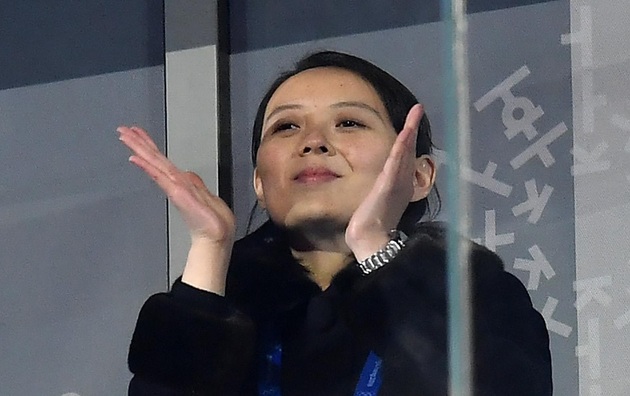Of all the family members who could eventually take the reins from North Korean leader Kim Jong Un, his sister seems like the obvious choice. As Bloomberg reports, Kim Yo Jong, in her early 30s, has been by her brother’s side at summits with U.S. President Donald Trump and Chinese President Xi Jinping, sat behind Vice President Mike Pence while representing North Korea at the 2018 Winter Olympics and became the first immediate member of the ruling family to visit Seoul, where she delivered a personal message from her brother inviting South Korean President Moon Jae-in to a summit.
The biggest potential hang-up: She’s a woman in a society rigidly controlled by men. While many North Korea watchers say bloodline is more important than gender, others are skeptical. “Yo Jong’s role will likely be limited to a regent at most” due to North Korea’s feudal patriarchy, said Yoo Ho-yeol, who teaches North Korean studies at Korea University and formerly advised South Korea’s unification ministry and defense ministry. “Not only the male-dominant leadership, but also ordinary people there would resist a female leader.”
The question of whether Kim Yo Jong will become North Korea’s first woman leader has suddenly become front and center as questions about her brother’s health intensify. Kim Jong Un hasn’t appeared in state media in two weeks, prompting a flurry of reports suggesting he could be incapacitated.
The Kim family dynasty has ruled North Korea for three generations since its founding after World War II, when the Soviet Union and the U.S. divided up control of the Korean Peninsula. Over that time, it has built up one of the world’s most vigorous personality cults -- making the preeminent claim to legitimacy in the dictatorship a bloodline said to stem from the sacred Mount Paektu near the Chinese border.
When Kim Jong Un took power after his father’s death in 2011, the big question was whether a leader in his 20s could rule a country that revered seniority. He soon exerted authority over geriatric generals and eliminated potential rivals: He executed his uncle and one-time deputy, Jang Song Thaek, and was suspected to have ordered the assassination of his exiled older half-brother, Kim Jong Nam, in Malaysia.
In many ways, Kim Yo Jong -- who has spent nearly a decade enmeshed in the state apparatus -- has been better groomed to take over the top leadership role. She could also similarly surprise anyone who doubts her ability to run the country, according to Soo Kim, a Rand Corp. policy analyst who specializes in Korean Peninsula issues.
‘Begins and Ends’
“I don’t think she needs to worry about gaining acceptance as a leader by the North Korean people by virtue of her Kim family bloodline,” Soo Kim said. “North Korea’s fate begins and ends with the Kim family.”
The other potential male Kim heirs are younger or less experienced in the halls of power in Pyongyang. His brother Kim Jong Chol has no official title and seems to be more interested in playing guitar than politics, while his nephew, Kim Han Sol, has denounced the regime and is believed to be living abroad.
South Korean media reported that Kim Jong Un has a 10-year-old son, but none of his children have been officially mentioned in state media. Thae Yong Ho, the former No. 2 at North Korea’s embassy in London who defected to South Korea, said in a radio interview that one potential successor is Kim Pyong Il, the only surviving son of North Korea’s founder Kim Il Sung who returned to the country last year following four decades overseas serving as a diplomat.
“Those who’re serving Kim Jong Un are the first generation in their 60s through 80s, so there’s at least a 30-year age gap with Yo Jong. In their eyes, Yo Jong is just a novice,” Thae said. The same argument was made when Kim Jong Un took power, though his youth didn’t block his ascent or his control over the old guard.
Either way, Kim Yo Jong remains the most prominent heir. Born in either 1988 or 1989, she was once a chubby-cheeked girl who loved dancing and was nicknamed “Princess Yo Jong” by her father, the late dictator Kim Jong Il, according to a biography of Kim Jong Un titled “The Great Successor” by Anna Fifield. She joined her brother at a school in Bern, Switzerland until about 2000 and later came back to study in North Korea.
Playing the Game
“It is almost unthinkable to have a female leader in North Korea” in part due to its “unique patriarchy based on the Confucianism,” said Lee Byong-chul, a former South Korea presidential adviser on national security issues who is now a professor at the Institute for Far Eastern Studies in Seoul. He questioned whether she could control the “old male generals” without her brother’s influence, and saw it more likely that either her uncle Kim Pyong Il or nominal head of state Choe Ryong Hae takes over.
Still, North Korea’s “cult-driven system” makes it essential to have a family member in charge, and Kim Jo Yong “has shown that she knows how to exercise authority,” according to Sung-Yoon Lee, who teaches Korean Studies at the Fletcher School of Law and Diplomacy at Tufts University in Massachusetts.
“The generals with the big guns have every interest in protecting their own power and they understand that power runs through the Kim family,” he said. “She will be able to wield power through a mix of terror and promotions. She knows how to play the game.”






